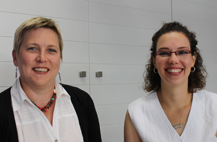Latest News Archive
Please select Category, Year, and then Month to display items
21 August 2019
|
Story Thabo Kessah
|
Photo Thabo Kessah
 Keafon Jumbam is gearing herself for the institutional Three Minute Thesis competition.
Keafon Jumbam is gearing herself for the institutional Three Minute Thesis competition.
Keafon Jumbam is a PhD candidate whose research on food and foxes has won her the first prize of R8 000 in the recent Faculty of Natural and Agricultural Sciences’ Postgraduate Flash Fact Competition. Her brief in the competition was to
summarise her research in three minutes, using only one static slide.“The competition started at departmental level on both campuses. The idea was that the best student in each department is then selected to go for the faculty-level competition on the Bloemfontein Campus. Summarising the entire research into three minutes is no easy feat, but a great way to gauge how well one has mastered your work,” she said.
Far-reaching research
“Thought-provoking presentations on research, ranging from technology to track academic progress, traditional medicine as alternatives to expensive prescriptions, and suggesting insects as food alternatives to curb hunger in this era of severe droughts and food shortages. The competition was tough, but it highlighted the level of research competitiveness on the Qwaqwa Campus. I hope that more students will join in such opportunities to build themselves up and to showcase our research output as Qwaqwa students,” added Jumbam from the
Department of Zoology and Entomology.
Institutional finals
Her next challenge is the institutional competition to be held on 23 August 2019, which could qualify her for the national competition.
Two Kovsie women involved in international sports events
2012-05-14
 |
|
Hetsie Veitch and Ebeth Grobbelaar
Photo: René-Jean van der Berg
14 May 2012
|
The organisers of two international sports events will depend on the expertise of two Kovsie women to make the events a major success.
The honour to be involved in international sports event has befallen Ms Hetsie Veitch and Ms Ebeth Grobbelaar.
The honour is the result of many years’ hard work and devotion in their respective fields.
In June, when the USA chooses the team to represent it at the 2012 Paralympic Games in London, Ms Veitch will be one of the classifiers who will determine in which categories athletes may compete.
Ms Veitch, Head of the Unit for Students with Disabilities at the University of the Free State (UFS), has been invited to be a member of the Classification Panel at the final USA Paralympic athletics trials. The trials take place from 27 June to 1 July 2012 in Indianapolis, Indiana, in the USA.
Ms Veitch and four other classifiers, two from Brazil, one from Canada and one from the USA, will test and verify the international classification status of the American athletes. No athlete will be allowed to take part without their classification being verified by the panel.
Ms Veitch, who recently achieved the status of International Paralympic Committee (IPC) Athletics Classifier, the highest achievement for a classifier in sport for the disabled, said that this category of sport has always been her passion.
“To have the opportunity to be involved in the classification of the USA team for the London 2012 Paralympic Games is a huge honour. I am going to start working on being chosen for the official IPC classification panel for the 2016 Paralympic Games in Brazil.”
Ms Grobbelaar, Assistant Director of the South African Testing Laboratory for Prohibited Substances at the UFS, was invited to be involved in the Drugs Control Centre in the unit against prohibited substances which will test sportsmen and women during this year’s Olympic Games in London.
Ms Grobbelaar said that even though the future of sportsmen and women would be in her hands, she is totally capable of carrying out the task that awaits her.
“I will be part of the laboratory team who will test the athletes’ samples for prohibited substances. I was part of the South African team who tested samples in our own laboratory in 2010 during the FIFA Soccer World Cup, as well as for the All Africa Games. The task is one I perform every day in our own laboratories. Each sample that I analyse determines an athlete’s future. The circumstances during the Olympic Games are different, but the work remains the same.”